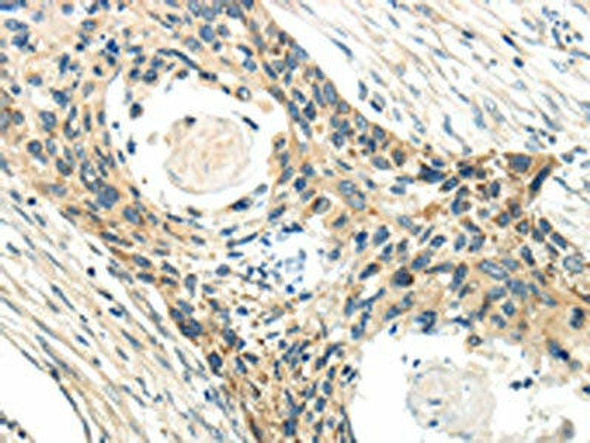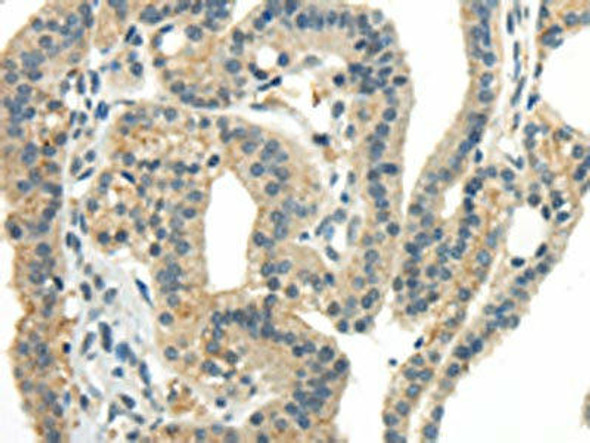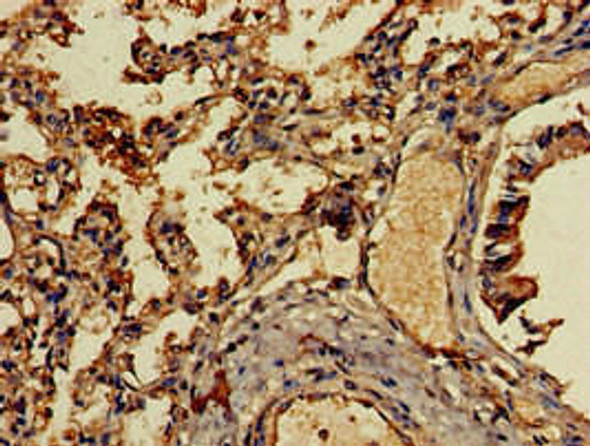Description
CCL13 Antibody (PACO14206)
The CCL13 Polyclonal Antibody (PACO14206) is a valuable tool for researchers studying CCL13, a chemokine involved in the regulation of immune responses. This antibody, generated in rabbits, exhibits high reactivity towards human samples and is specifically validated for use in Western blot applications. By binding to the CCL13 protein, this antibody allows for accurate detection and analysis in various cell types, making it an ideal choice for studies in immunology and inflammatory conditions.
CCL13, also known as monocyte chemotactic protein 4 (MCP-4), plays a crucial role in recruiting immune cells to sites of inflammation and has been implicated in diseases such as asthma, arthritis, and cancer. Understanding the function of CCL13 is essential for developing targeted therapies that modulate immune responses and combat inflammatory conditions. By utilizing the CCL13 Polyclonal Antibody, researchers can gain valuable insights into the role of this chemokine in health and disease.
| Antibody Name: | CCL13 Antibody (PACO14206) |
| Antibody SKU: | PACO14206 |
| Size: | 50ul |
| Host Species: | Rabbit |
| Tested Applications: | ELISA, WB |
| Recommended Dilutions: | ELISA:1:2000-1:5000, WB:1:500-1:2000 |
| Species Reactivity: | Human |
| Immunogen: | Fusion protein of human CCL13 |
| Form: | Liquid |
| Storage Buffer: | -20°C, pH7.4 PBS, 0.05% NaN3, 40% Glycerol |
| Purification Method: | Antigen affinity purification |
| Clonality: | Polyclonal |
| Isotype: | IgG |
| Conjugate: | Non-conjugated |
 | Gel: 12%SDS-PAGE, Lysate: 50 μg, Lane: 293T cells, Primary antibody: PACO14206(CCL13 Antibody) at dilution 1/400, Secondary antibody: Goat anti rabbit IgG at 1/8000 dilution, Exposure time: 10 seconds. |
| Background: | This gene is one of several Cys-Cys (CC) cytokine genes clustered on the q-arm of chromosome 17. Cytokines are a family of secreted proteins involved in immunoregulatory and inflammatory processes. The CC cytokines are proteins characterized by two adjacent cysteines. The cytokine encoded by this gene displays chemotactic activity for monocytes, lymphocytes, basophils and eosinophils, but not neutrophils. This chemokine plays a role in accumulation of leukocytes during inflammation. It may also be involved in the recruitment of monocytes into the arterial wall during artherosclerosis. |
| Synonyms: | chemokine (C-C motif) ligand 13 |
| UniProt Protein Function: | CCL13: Chemotactic factor that attracts monocytes, lymphocytes, basophils and eosinophils, but not neutrophils. Signals through CCR2B and CCR3 receptors. Plays a role in the accumulation of leukocytes at both sides of allergic and non-allergic inflammation. May be involved in the recruitment of monocytes into the arterial wall during the disease process of atherosclerosis. May play a role in the monocyte attraction in tissues chronically exposed to exogenous pathogens. By IL1/interleukin-1 and TNF. Widely expressed. Found in small intestine, thymus, colon, lung, trachea, stomach and lymph node. Low levels seen in the pulmonary artery smooth muscle cells. Belongs to the intercrine beta (chemokine CC) family. |
| UniProt Protein Details: | Protein type:Secreted, signal peptide; Motility/polarity/chemotaxis; Chemokine; Secreted Chromosomal Location of Human Ortholog: 17q11.2 Cellular Component: extracellular space Molecular Function:chemokine activity; receptor binding Biological Process: cellular calcium ion homeostasis; regulation of cell shape; cell-cell signaling; eosinophil chemotaxis; cytoskeleton organization and biogenesis; immune response; signal transduction; inflammatory response; chemotaxis |
| NCBI Summary: | This antimicrobial gene is one of several Cys-Cys (CC) cytokine genes clustered on the q-arm of chromosome 17. Cytokines are a family of secreted proteins involved in immunoregulatory and inflammatory processes. The CC cytokines are proteins characterized by two adjacent cysteines. The cytokine encoded by this gene displays chemotactic activity for monocytes, lymphocytes, basophils and eosinophils, but not neutrophils. This chemokine plays a role in accumulation of leukocytes during inflammation. It may also be involved in the recruitment of monocytes into the arterial wall during artherosclerosis. [provided by RefSeq, Sep 2014] |
| UniProt Code: | Q99616 |
| NCBI GenInfo Identifier: | 3024128 |
| NCBI Gene ID: | 6357 |
| NCBI Accession: | Q99616.1 |
| UniProt Related Accession: | Q99616 |
| Molecular Weight: | |
| NCBI Full Name: | C-C motif chemokine 13 |
| NCBI Synonym Full Names: | C-C motif chemokine ligand 13 |
| NCBI Official Symbol: | CCL13 |
| NCBI Official Synonym Symbols: | NCC1; CKb10; MCP-4; NCC-1; SCYL1; SCYA13 |
| NCBI Protein Information: | C-C motif chemokine 13 |
| UniProt Protein Name: | C-C motif chemokine 13 |
| UniProt Synonym Protein Names: | CK-beta-10; Monocyte chemoattractant protein 4; Monocyte chemotactic protein 4; MCP-4; NCC-1; Small-inducible cytokine A13Cleaved into the following 3 chains:C-C motif chemokine 13, long chain; C-C motif chemokine 13, medium chain; C-C motif chemokine 13, short chain |
| Protein Family: | Meiotic coiled-coil protein |
| UniProt Gene Name: | CCL13 |
| UniProt Entry Name: | CCL13_HUMAN |
| Secondary Antibody |
| Anti-HRP Goat Anti-Rabbit IgG (H+L) Antibody (CABS014) |
| Recommended Products |
| Anti-FITC Goat Anti-Rabbit IgG (H+L) Antibody (CABS011) |
| Anti-HRP-conjugated Beta Actin Antibody (CABC028) |










